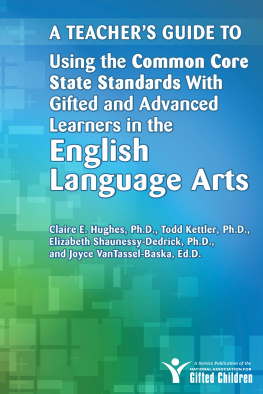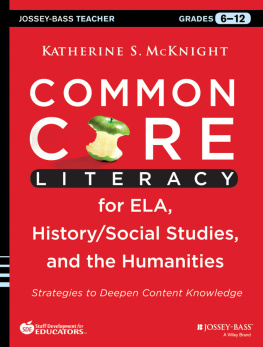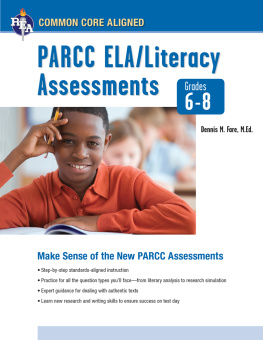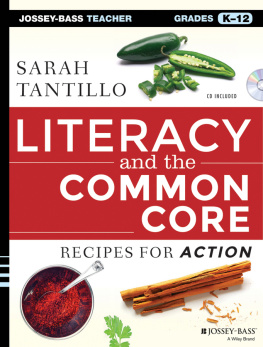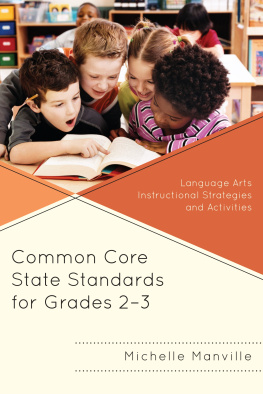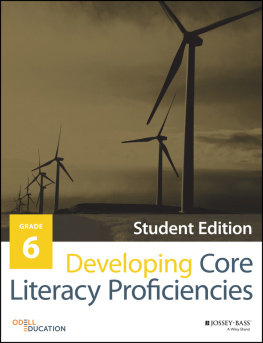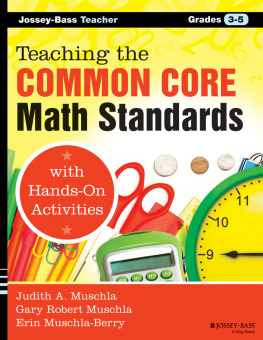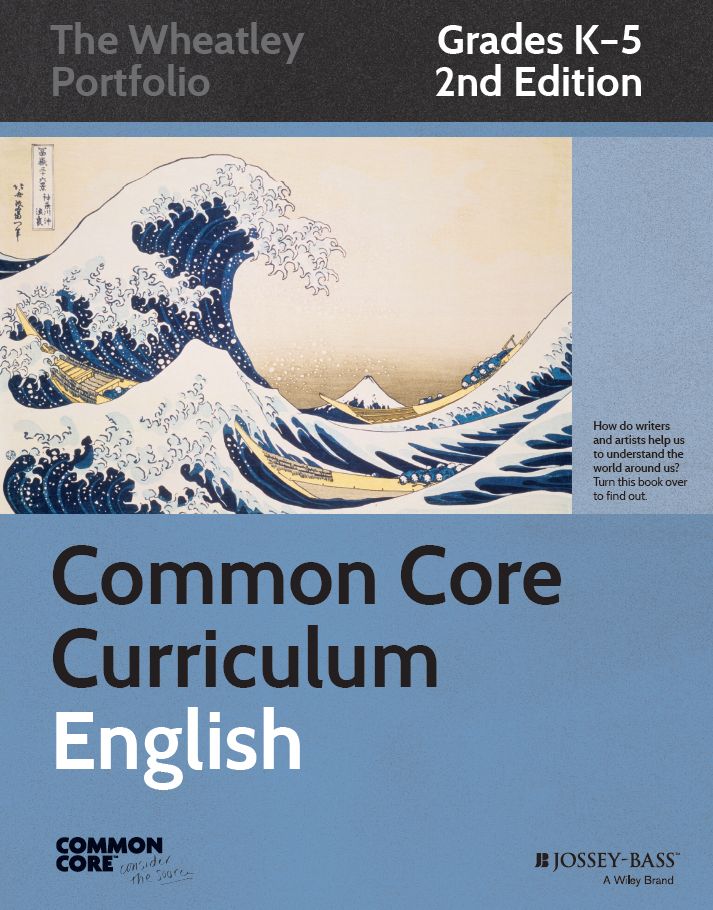
CONTENTS
Guide
Pages
Other Books by Common Core
The Wheatley Portfolio
Common Core Curriculum: English, Grades 68, Second Edition
Common Core Curriculum: English, Grades 912, Second Edition
The Alexandria Plan
Common Core Curriculum: United States History, Grades K12
Common Core Curriculum: World History, Grades K12
Common Core Curriculum: United States History, Grades 35
Common Core Curriculum: World History, Grades 35
Eureka Math
Common Core Mathematics, A Story of Units: Grades K5
Common Core Mathematics, A Story of Ratios: Grades 68
Common Core Mathematics, A Story of Functions: Grades 912
Common Core Curriculum: English, Grades K5
Second Edition
Cover design: Chris Clary
Cover image: Katsushika Hokusai (1760-1849), The Great Wave, 183133, Japanese color woodblock print. Photo: V&A Images, London/Art Resource, NY
Copyright 2014 by Common Core, Inc. All rights reserved.
Published by Jossey-Bass
A Wiley Brand
One Montgomery Street, Suite 1200, San Francisco, CA 94104-4594 www.josseybass.com
No part of this publication may be reproduced, stored in a retrieval system, or transmitted in any form or by any means, electronic, mechanical, photocopying, recording, scanning, or otherwise, except as permitted under Section 107 or 108 of the 1976 United States Copyright Act, without either the prior written permission of the publisher, or authorization through payment of the appropriate per-copy fee to the Copyright Clearance Center, Inc., 222 Rosewood Drive, Danvers, MA 01923, 978-750-8400, fax 978-646-8600, or on the Web at www.copyright.com. Requests to the publisher for permission should be addressed to the Permissions Department, John Wiley & Sons, Inc., 111 River Street, Hoboken, NJ 07030, 201-748-6011, fax 201-748-6008, or online at www.wiley.com/go/permissions.
Limit of Liability/Disclaimer of Warranty: While the publisher and author have used their best efforts in preparing this book, they make no representations or warranties with respect to the accuracy or completeness of the contents of this book and specifically disclaim any implied warranties of merchantability or fitness for a particular purpose. No warranty may be created or extended by sales representatives or written sales materials. The advice and strategies contained herein may not be suitable for your situation. You should consult with a professional where appropriate. Neither the publisher nor author shall be liable for any loss of profit or any other commercial damages, including but not limited to special, incidental, consequential, or other damages. Readers should be aware that Internet Web sites offered as citations and/or sources for further information may have changed or disappeared between the time this was written and when it is read.
Jossey-Bass books and products are available through most bookstores. To contact Jossey-Bass directly call our Customer Care Department within the U.S. at 800-956-7739, outside the U.S. at 317-572-3986, or fax 317-572-4002.
For more information about Common Core, Inc., visit commoncore.org.
Wiley publishes in a variety of print and electronic formats and by print-on-demand. Some material included with standard print versions of this book may not be included in e-books or in print-on-demand. If this book refers to media such as a CD or DVD that is not included in the version you purchased, you may download this material at http://booksupport.wiley.com. For more information about Wiley products, visit www.wiley.com.
Library of Congress Cataloging-in-Publication Data
Common core curriculum: English, grades K-5 Second edition.
pagescm. (Common core english language arts)
Includes index.
Description based on print version record and CIP data provided by publisher; resource not viewed.
ISBN 978-1-118-81135-1 (pbk.)
ISBN 978-1-118-81249-5 (ebk.)
ISBN 978-1-118-81265-5 (ebk.)
1. Language arts (ElementaryCurriculaUnited StatesCase studies.2. Language arts (Elementary) StandardsUnited StatesStates.
LB1576.C5785 2014
372.6dc23
2013045493
Foreword
Good Schools: The Salt of Society
Three hundred years ago Cotton Mather preached, A Good School deserves to be calld the very Salt of the Town that hath it. Without a school wherein the Youth may by able Masters be Taught the Things that are necessary to qualify them for future Serviceableness, a community will founder. Mathers advice to townspeople in Puritan New England reflects one of the philosophical underpinnings of the Common Core Curriculum in English Language Arts: Schools matter. Curriculum matters. Teachers matter.
In order to determine which things should be taught, we must of course first define what it means to be serviceable in a twenty-first-century democratic society. To ensure a capable workforce and build a strong economy, high levels of literacy and numeracy are obviously essential. But what about the need for students to develop empathy and thoughtfulness? It is shortsighted to equate the value of education with economic growth. Like salt, good schools with rich curricula enhance the community by adding depthand piquancy. Like salt, they are a preservative, ensuring that a societys values endure.
Many of the benefits weve come to demand as our rights in a modern society depend on high levels of employment, but if we shift the discussion of the purpose of school from job training to preparing Americas children to lead a worthwhile life, the calculus changes. Is simply working nine to five for forty years what you most aspire to for your children? Or do you want them to have an education that invites exploration of essential questions, inspires challenges to the status quo, and somehow prepares them for what we cannot yet know? Most parents want both.
The conundrum for curriculum developers is to avoid becoming so caught up in preparing students to make a livingwhich starts with paying attention in kindergarten; earning good grades through elementary school, middle school, and high school; achieving competitive SAT and ACT scores; and winning a place in college or in the workplacethat we lose sight of educating students to enrich their lives.
In Not for Profit: Why Democracy Needs the Humanities, philosopher Martha Nussbaum warns that, With the rush to profitability in the global market, values precious for the future of democracy, especially in an era of religious and economic anxiety, are in danger of getting lost. One means of learning about the problems that have beset and continue to bedevil humanity is through the study of the humanitiesliterature and art, history and philosophy. This is the kind of education the Common Core Curriculum offers. I believe it is the education that every generation of citizens needs.
Unit 3 of grade 1, Life Lessons, offers young children opportunities to explore the kind of education Martha Nussbaum recommends. As they work through the unit, Students read and listen to fables with morals. They also learn about rules for life in a book of manners. Reading the life story of George Washington Carver, students learn about a man who had to overcome obstacles in life to make important contributions to science and agriculture. Students also learn about Thomas Edisons work with electricity and the rules for its safe use. Students write narratives focused on life lessons and create informative/explanatory posters about electricity. Finally, students focus on descriptive words while studying the artwork of Georgia OKeeffe. This interdisciplinary approach integrates the study of science and builds students background knowledge. In so doing, it strengthens their reading comprehension and develops their facility with reading informational textsa key expectation of the Common Core State Standards. It also invites children to investigate Georgia OKeeffes paintings and build their cultural literacy.
Next page

